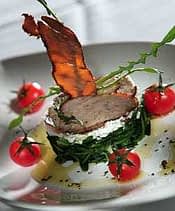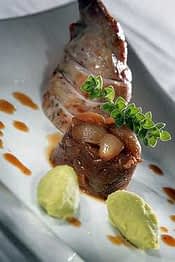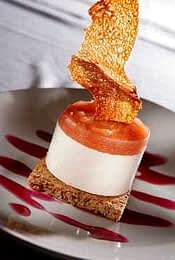Twenty liters of olive oil a day may seem too much for the average cook, but for Cretan-born Yiannis Tsivourakis it’s the usual quantity of oil he uses daily in his kitchen. You could say he has a special affinity for the ingredient.
The executive chef at the five-star Minoa Hotel located in Chania on the island of Crete, Tsivourakis couldn’t do his culinary magic without the golden liquid. And it is thanks to his persistence, that Mediterranean-style menus feature at all four of the hotel’s restaurants, with special nights dedicated to genuine Cretan cuisine.
We (Greeks) tried to ‘Europeanize’ our- selves too quickly
 Born and raised in a mountainous village on Crete, Tsivourakis grew up on the local diet. As he became older, he became very involved in the process of producing and preparing the food he ate. While most boys in rural Crete spent their days helping out with fieldwork, Yiannis spent his time in the kitchen, making cheese, fennel pies and olive oil cake. Encouraged by a teacher who saw his talent, Tsivourakis decided to study cooking and thus began his journey as a professional chef.
Born and raised in a mountainous village on Crete, Tsivourakis grew up on the local diet. As he became older, he became very involved in the process of producing and preparing the food he ate. While most boys in rural Crete spent their days helping out with fieldwork, Yiannis spent his time in the kitchen, making cheese, fennel pies and olive oil cake. Encouraged by a teacher who saw his talent, Tsivourakis decided to study cooking and thus began his journey as a professional chef.
Tsivourakis is one of the few chefs who uses olive oil almost exclusively as the main ingredient for all his culinary creations. “Olive oil for me is precious but also an easy ingredient in the kitchen,” he explains.
 Despite having worked with internationally acclaimed chefs, his food still reflects the humble Cretan tastes of his childhood. Not only because he was born there, but due to what he describes as an “inner obligation” to promote the products ofhis homeland. “When I first interacted with chefs from other parts of the world, I felt inferior, especially when I saw professionals from other countries using and promoting their local products,” Tsivourakis admits. “Not only are there very few Greek products known internationally, they are not known in Greece either,” says Tsivourakis, who believes that promoting and advertising these undervalued products would benefit both Greek cuisine and the local economy.
Despite having worked with internationally acclaimed chefs, his food still reflects the humble Cretan tastes of his childhood. Not only because he was born there, but due to what he describes as an “inner obligation” to promote the products ofhis homeland. “When I first interacted with chefs from other parts of the world, I felt inferior, especially when I saw professionals from other countries using and promoting their local products,” Tsivourakis admits. “Not only are there very few Greek products known internationally, they are not known in Greece either,” says Tsivourakis, who believes that promoting and advertising these undervalued products would benefit both Greek cuisine and the local economy.
For him these humble and underestimated ingredients are what he loves most about Cretan cuisine. Second on his list of favorite ingredients, after olive oil, are horta, wild greens available freely throughout the Greek countryside. “One can find a wide variety of wild greens here in Crete, each having their own distinctive aroma and taste,” he says. “We use them in a variety of dishes such as pies, with seafood, accompanying meat or we eat them with olive oil, fresh tomato and cheese.”
As for the olive oil, it is the basis for almost every single dish he prepares, and luckily there is no shortage of it on Crete, or in Greece overall. “Everyone on Crete has their own olive trees, and the olive oil we use at the hotel is provided by the owner from his own olive orchards,” he explains.
 But don’t expect any eccentric dishes coated in olive oil. “I don’t use olive oil just for the sake of using it,” he is quick to point out. The extra virgin olive oil is used in generous amounts but only in dishes that call for it. Vinaigrettes, sauces and even frying is done with olive oil. Tsivourakis considers olive oil to be a light ingredient and this is expressed in the nuances of his cooking. “Customers always tell me they’ve enjoyed a truly light meal, and that they don’t leave the table feeling stuffed. This I attribute to the olive oil,” he says.
But don’t expect any eccentric dishes coated in olive oil. “I don’t use olive oil just for the sake of using it,” he is quick to point out. The extra virgin olive oil is used in generous amounts but only in dishes that call for it. Vinaigrettes, sauces and even frying is done with olive oil. Tsivourakis considers olive oil to be a light ingredient and this is expressed in the nuances of his cooking. “Customers always tell me they’ve enjoyed a truly light meal, and that they don’t leave the table feeling stuffed. This I attribute to the olive oil,” he says.
Insisting on local Cretan cuisine is not necessarily an easy task, and Tsivourakis has had his share of obstacles along the way, ironically not from tourists but from locals. “When I prepare dishes that are based on vegetables such as wild greens and legumes, many of the locals may be offended by the simple and humble ingredients that I use,” Tsivourakis says, expressing his dismay. His “mission” has not only been to introduce Cretan cuisine to foreigners who visit Greece, but to also re-introduce the culinary delights of Crete to the locals.
Most Cretans, he reveals, are not aware of the value of their local diet, and do not follow it. “We have abandoned our diet for many reasons: less time, less interest in family life, more money. We tried to ‘Europeanize’ ourselves too quickly, and as a result we adopted new nutritional habits without knowing the value of the nutritional habits handed down to us,” he says.
Tsivourakis believes that changing this mentality can only start at home. “Parents need to cook at home and start using the ingredients that make up the Cretan diet for it to become a way of life once again,” he says.
Although he is saddened by the overabundance and accessibility of fast and easy food, Tsivourakis does a see a re-emergence of the traditional Greek diet. The recent economic turmoil has driven the Greeks back to their humble, affordable and healthy cuisine… or perhaps it is due to enlightened chefs like Tsivourakis, who are showing them what they’ve been missing.
.










